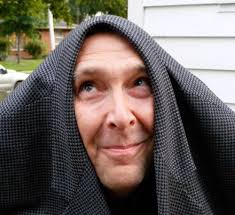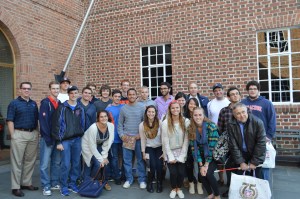So like a fool I trusted Apple to assure its screen reader known as Voiceover would be functional with the release of the new IOS 8 operating system for the iPad and iPhone. Lo and behold IOS 8 has more VoiceOver bugs than a prairie cat house. When using iBooks the program stops reading or causes the iBook to collapse. This, just as I’m leaving for ten days in China. How I wish I hadn’t updated my devices. Thanks for nothing Tim Cook.
Month: September 2014
Zounds!
Its hard some days to be kind. Alright it’s hard most days. When a professor used blindness pejoratively in a meeting today I was, if not unkind, forceful in my response. I’m not giving ground when it comes to ableist lingo for why should I? And why should you if you’re a woman in a male dominated environment or a person of color in a traditionally while cultural context? But always when you speak up in these matters there’s a look of disapprobation. Zounds! That’s the risk you take.
Mercy Mercy
I think about Paul Eluard as the political season turns dark and darker. Resistance fighter, poet, surrealist, humanitarian—Eluard who never gave up on love. What kind of man do I want to be?
I wish to be tender in the darkest times. Strong also. I pledge to stand in the godforsaken places and laugh. What kind of laugh? The premise of all life, surprise without evident mercy.
Going Down to the Pereus
In a few moments I will go to the campus of Syracuse University where I’m a professor and administrator. I pledge before I leave my home not to confuse the university with my life and lest you misunderstand me, I’m not speaking of freedom—either of thought or deed—for freedom of speech and inquiry are ineluctable and never disposable—but the persistent and easy illusion that Syracuse is “my” university. The ease of identification with a college or university is guaranteed. If you’re at The Ohio State University you want to bleed scarlet and gray; here at Syracuse everyone wears orange. I think these are innocent pastimes until you fall prey to imagining your version of the institution, believing your vision for it is of greater value than the ideas of others. Academics are susceptible to weak super-egos. Some don’t know it. Those who do are often the wisest. Collaboration and rejection both depend on the awareness that your life, the “inner life” does not depend on strict affinity with institutions.
I say this as I ready myself. I admire my colleagues. I like some more than others. I enjoy the give and take of earnest and clear thinking. I take some ideas to heart, leave others aside. I believe I have some valuable things to share. When my ideas are rejected I will walk my life into another forest. I’m not talking about academic freedom. I believe academic freedom is non-negotiable. The recent developments at the University of Illinois, Champaign-Urbana are a disgrace to the principles of free inquiry. I give no ground on that score. Instead I’m recognizing how institutions rise and fall in worlds of trouble or good fortune. In turn you must know your heart and savor the best that you know. Today I will share my best thinking. Tomorrow no one will remember. We are all both larger and smaller than our names.
Predicament
Poetry gets out of hand
climbs the maple out back
chatters like a man
who knows jokes
or soon will freeze to death.
“He’s my friend” I say—
but perhaps I’m a fool—
poetry monkey
is not
in any way (productive)
gallops over branches
without reason
but as my wife would say:
“He has beautiful
eyelashes.”
Shame on the Rush-Henrietta School District and Its Dunder Headed Attorneys
There’s a story in the New York Daily News about a grade school girl who has been denied the right to bring her service dog to school. The Rush-Henrietta school district announced that the dog would be a distraction to students and might disturb people with allergies. Amazingly the district’s attorneys announced that the denial of a service dog was ok.
As a long time guide dog user I know all about this ableist argument. “Your dog might trigger allergies in other people” is my favorite ableist argument. The reason? Because it reveals instantaneously an overt failure to understand that the ADA is a civil-rights act. The allergic in this world don’t get to trump my right to be somewhere.
I’m not shocked that the Rush-Henrietta school district has violated the law. The ongoing battle for the hearts and minds of able bodied people goes on. Disability whether its invisible or visible does not consign a child or adult to marginal citizenship. And service dogs are the law.
These Eager Business Aims…
Last night I dreamt of my father who was sad in a squinty room of the subconscious. In life he was like the rest of us—by turns funny, somber, witty, and occasionally distant. In America nowadays its requisite to blame your problems on your parents and Lord knows I might get away with this but honesty is tougher than cartoon Freud and I know most of my difficulties are my own.
My mother was a drunk and a prescription pill abuser. One night, clutching a knife, she stalked my sister through our house. She threw glassware, dishes, or on a good day she simply passed out in the living room. My father ignored everything, stuck to his job. At times he’d open up and relate how his life was unbearable. I was the disabled kid, the one whose problems were unspoken but always in the room and I grew up thinking the family’s unhappiness stemmed from my blindness. My parents have been gone now for fourteen years. They turn up in my dreams but never together.
With therapy and contemplation I’ve come to see just how much the human imagination can hurt us. If my parents weren’t emotionally supportive so be it. I allowed myself to internalize and narrate their miseries as if they were products of my blindness, a self-destructive fantasy that occupied me for years. I was like the Japanese poet Issa’s “crow with no mouth”—I was unlit and sharply alive but without the necessary and nuanced self-awareness that leads to honest language. I suspect this is why I don’t like much contemporary fiction and why I avoid short stories in particular. The narrators in most American short stories lack awareness that imagination can be debilitating. Story after story unfolds around the misery of divorce and a tragicomic insistence that the put upon narrator has something like a heart. The tenor of the story—its burden if you will—is to convey the injustice of emotional life. Few stories bring readers to a place where the narrator understands his complicity in illusion. There are exceptions. But usually contemporary short stories depend on nascent victimhood—a reader response agreement—we’re all budding victims because as Wallace Stevens once wrote: “the world is ugly and the people are sad.”
Are my difficulties really my own? Doesn’t the culture hold blind people at arm’s length? Is it not true I’ve had to fight for my place in the village square? Yes yes. And yet so much is still the work of the deleterious imagination. When I was 17 years old and in danger of dying from anorexia (my parents, blindness, ugly school administrators, cruelty of teenagers…) a friend gave me a book of poems. I read Walt Whitman:
Hast Never Come to Thee an Hour?
Hast never come to thee an hour,
A sudden gleam divine, precipitating, bursting all these bubbles,
fashions, wealth?
These eager business aims—books, politics, art, amours,
To utter nothingness?
**
These eager business aims—the phrase holds as true for the imagination as it does for fashions or what often feels to me like “victim theory”—the business of abjection. So much work of the imagination is finally utter nothingness. What a relief! Surely its a commonplace of the avant garde to hold bourgeois culture in suspicion and one can read Whitman’s poem that way.
But the key word is “eager”—defined as “keen, enthusiastic, avid, fervent, ardent, motivated, wholehearted, dedicated, committed, earnest”—all central to imagination. “Eager” is also sinister. Its a word of suspension and indeterminacy. Eager also means: anxious, impatient, longing, yearning, wishing, hoping, hopeful; on the edge of one’s seat, on tenterhooks, on pins and needles; (informal) itching, gagging, dying.
As a teenager who was blind I was sure that whatever happiness might befall me would be the product of a miracle. That’s the problem with the eager imagination. It believes in rescue. Its a fairy tale yearning.
I’m in mind of this after a dream of my father. He was gray in my dream, two dimensional, like a figure in the Greek underworld. I think he went to his grave believing in the bubble of rescue.
Baseball, Research, Apple Pie, and Scholarship
There are pleasures in life and then of course there are pleasures in life. The second pleasure comes from introducing university students to the art of archival research. Yesterday I accompanied Professor Rick Burton of Syracuse U’s Falk College of Sport and Human Dynamics as he took a group of students in his honors class to the Baseball Hall of Fame in Cooperstown, New York. We were given an advanced tour of the world’s most famous sport museum by Brad Horn (pictured in the photo above on the far left) who is the VP for Communications and Education. Prof. Burton is in the back row. I’m the guy on the far right with the leather jacket holding a bag of “merch”.

(Pictured: SU Honors students listen to Jim Gates as he describes rare historical artifacts from baseball history.)
Students were given a tour of the Hall and met with senior librarian Jim Gates who showed students some rare holdings including the famous Babe Ruth check sent to the Boston Red Sox by the New York Yankees. In 1919 the teams didn’t have their modern names and the check references the Boston American Baseball Club.
I couldn’t resist photographing the original publicity poster for my favorite baseball movie “Pride of the Yankees” starring Gary Cooper and Teresa Wright. Babe Ruth is also in the film.
Jim Gates pointed out the research about baseball isn’t always about the sport but about American history. Many scholars come to the Hall of Fame’s library from around the world to explore the intricacies and complexity of US history. One of the students said later: “That was the best thing I’ve ever experienced.” I love our Honors students!
Mallard
A mallard was in my dream last night—but she wasn’t one of those birds of dream, she was a real bird, swimming on the lake of my unconscious. I knew it. And I knew it this morning, when, early I walked the dogs and the orphic crows spoke up, narrating their private red wind.
In Praise of the Half Finished Culture
There are three thousand tiny American flags planted on a hill at Syracuse University and above them a sign says “Never Forget”.
I’m predisposed to not forgetting. I lost friends on 9/11.
Walking yesterday and finding the flags and sign I wondered what the display and admonition meant.
William Gass wrote: “culture has completed its work when everything is a sign”—surely a dark irony as a “completed” culture would likely be wholly propagandistic. Wisdom fares best in uncompleted cultures, the ones with porous boundaries. Tomas Transtromer the great Swedish poet has a poem called “The Half Finished Heaven” that speaks to this:
The Half-Finished Heaven
Despondency breaks off its course.
Anguish breaks off its course.
The vulture breaks off its flight.
The eager light streams out,
even the ghosts take a draft.
And our paintings see daylight,
our red beasts of the Ice Age studios.
Everything begins to look around.
We walk in the sun in hundreds.
Each man is a half-open door
leading to a room for everyone.
The endless ground under us.
The water is shining among the trees.
The lake is a window into the earth.
Excerpt From: Tomas Tranströmer. “The Great Enigma: New Collected Poems.” iBooks. https://itun.es/us/WAORD.l








